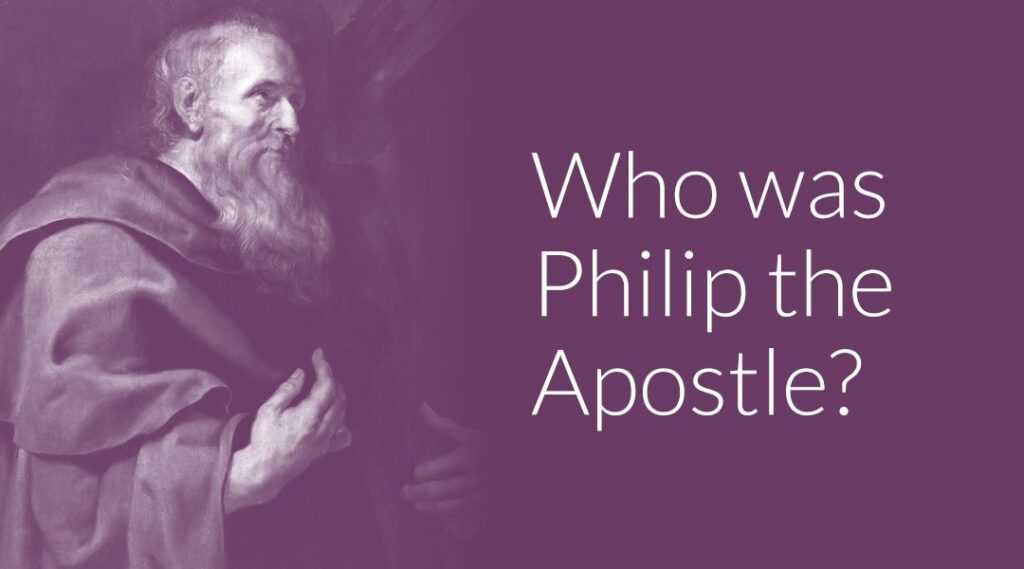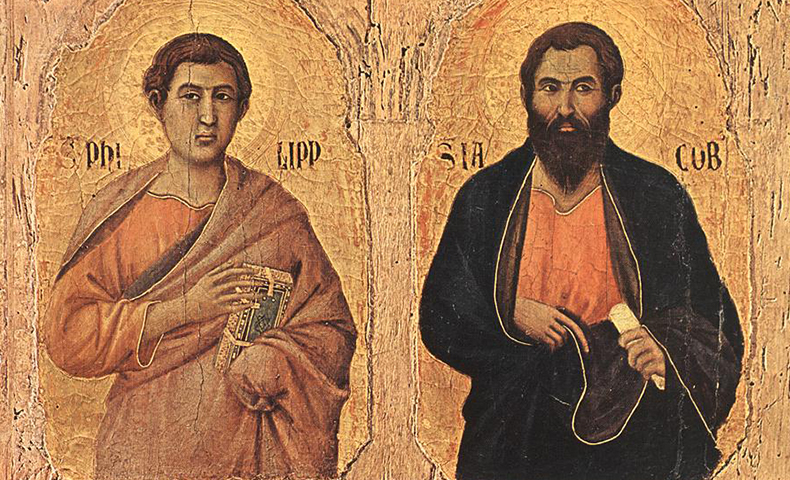
* * * *
May 14, 2022 – Sunday, May 1, 2022, was technically the Feast Day for St. Philip and St. James, Apostles. I say “technically” because it got transferred from Sunday to Monday, May 2. The same thing happened in 2016, as noted in that year’s post, on Philip and James – Saints and Apostles.
The post noted some confusion about which “James” is remembered on May 1 (or 2). The New Testament listed at least three “James” who could fit the bill, and there were possibly as many as eight. The Daily Office article, “St. Philip & St. James (transferred),” lists the eight possibilities. It also notes the consensus view that the James at issue was “James the Less,” son of Alphaeus. We know very little about him, “except that his name appears on lists of the Twelve.” There was also a note on why the name James was so popular at the time, detailed in the notes.
Another possibility is James the Greater, also called James the son of Zebedee. He’s the patron saint of pilgrims, and the 2016 post noted that a good pilgrimage can be “one of the most chastening, but also one of the most liberating” human experiences. Which led to an observation, a la Dirty Harry: “So, punk, do you feel like getting chastened and liberated?”
My 2015 post Total love – and “the Living Vine” talked about some Sunday Bible readings, including Acts of the Apostles (8:26-40) and Philip and the Ethiopian eunuch:
Philip the Evangelist was told by an angel to go to the road from Jerusalem to Gaza, and there he met the Ethiopian eunuch… The eunuch was sitting in his chariot reading the Book of Isaiah, and had come to Isaiah 53:7-8. Philip asked the Ethiopian, “Do you understand what you are reading?” He said[,] “How can I understand unless I have a teacher to teach me?” …Philip told him the Gospel of Jesus, and the Ethiopian asked to be baptized. They went down into some water and Philip baptized him.
The post also noted that as a eunuch the Ethiopian was beyond the pale –in other words, “untouchable” – according to Deuteronomy 23:1. The King James Bible – the one God uses – puts the matter rather delicately: “He that is wounded in the stones, or hath his privy member cut off, shall not enter into the congregation of the LORD.“
Yet Philip, guided by God’s Spirit, does not hesitate to share the good news of God’s love and salvation with this less than whole Ethiopian and to baptize him into the faith, to welcome him into the life of the Christian church. This new faith is for all, God’s love is for every human being no matter what disability or disease or affliction has come our way.
(See “Wesley Uniting Church.”) In other words, the point of Acts 8:26-40 – and the story of Philip and the Ethiopian eunuch – is that God’s Love is Universal. (On that note see also Jonah and the bra-burners.) So here’s to “Philip and James – Saints and Apostles,” and their Feast Day.
For another blast from the past, I also wrote about the feast day in St. Philip and St. James – May, 2020. It began with a note that “we are now in the eighth full week of the COVID-19 pandemic.” And according to my calculations, we just ended the 113th full week of COVID, with no end in sight. (28 months and one week.) That post talked about strategies for getting through such a time of crisis. But, reviewing it led me to another example of “never too old to learn.”
It turns out “today’s” confusion doesn’t end with eight men Jameses. “Philip the Apostle was one of the 12 main disciples of Jesus Christ. He’s one of four people named Philip in the Bible, and he’s often confused with Philip the Evangelist.” (The other two were “sons of King Herod the Great.’) To clarify, go back to the Daily Office article, “St. Philip & St. James (transferred):
Philip the Apostle is frequently confused with Philip the Deacon, whom we read of in the Book of Acts (A 6:7; 8:5-40; 21:8f), and who is commemorated on 6 June. For arguments that they are in fact the same, see that BIO… Philip the Apostle appears in the Synoptic Gospels and in Acts only as a name on the list of the Twelve, but [also] early in the ministry of Our Lord (J 1:44), and [bringing] his friend Nathanael to Jesus as well. When some Greeks (or Greek-speaking Jews) wished to speak with Jesus, they began by approaching Philip (J 12:20ff).
And according to Wikipedia (as noted), “Philip the Evangelist was told by an angel to go to the road from Jerusalem to Gaza, and there he encountered the Ethiopian eunuch.” But personally, I like the point of Acts 8:26-40 being that God’s Love is Universal. And that His love is so universal that He’s willing to accept anyone. (Who turns to Him. See John 6:37.)
So here’s to “Philip and James” – whoever you are – and their Feast Day, whether May 1 or 2.
* * * *

* * * *
The upper image is courtesy of Who Was Philip the Apostle? The Beginner’s Guide. That’s the one that led to the confusion about two possible Philips, the “Apostle” and the “Evangelist.”
Re: Why “James” was so popular. Briefly, because that was the name associated with Jacob, who became “Israel” when he wrestled with the angel in Genesis 32:24-32. (In the King James Version, the one God uses.) The English name “James” is a variant of the name “Jacob,” or in Hebrew, “Ya’akov.”
The lower image is courtesy of Saints Philip and James – Franciscan Media. Caption: “Image: Detail of reredos | Polytych by Maestà | Wikimedia.”
* * * *